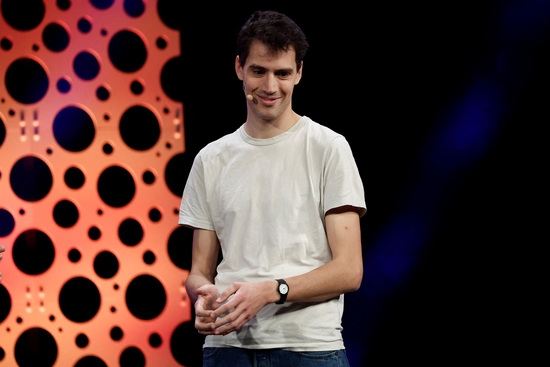
France’s AI rise changes the global AI industry landscape
Enlarge imageArthur Mensch, CEO of Mistral AI, is giving a speech at the Amazon Web Services Summit held in Paris, France in April. Photo = Reuters France is rapidly emerging as a new central axis of the global AI industry based on the explosive growth of Mistral and Hugging Face, heralding a fundamental change in the US-centered AI hegemony structure.
On the 22nd (local time), Axios conducted an in-depth analysis of France’s strategy to become an AI hub and its ripple effects, highlighting the emergence of a new AI powerhouse comparable to Silicon Valley.
France’s Silicon Valley challenge is already showing visible results. For example, Mistral achieved a corporate value of $2 billion within 9 months of its establishment, and its latest AI model shows performance comparable to GPT-4, but the development cost is only one-third.
AI developer platform Hugging Face has established itself as a global standard platform for sharing AI models and codes. IBM recently officially announced that it had improved processing performance by 50% by introducing Mistral’s Mixtral-8x7b model into its Watson
The driving force behind France’s success can be found in the combination of government support and private innovation. While Clara Chapaz, CEO of the public support organization ‘La French Tech’, is leading France’s digital innovation, the world’s best mathematics education institutions continue to produce top-class AI talent, such as the founders of Mistral from Google DeepMind and Meta. there is. In addition, nine government-supported AI research institutes have established a full-cycle support system from basic research to commercialization, and energy policies centered on nuclear power generation provide a stable supply of power required for large-scale AI calculations.
Silicon Valley dinosaurs are flocking to Paris. Microsoft invested $16 million in Mistral and signed a strategic partnership, and Amazon selected Mistral as its seventh basic model development partner. Google established an AI research center in Paris with 300 employees, and OpenAI also announced its expansion into Paris. This proves that France is emerging as a rival to Silicon Valley beyond simply being an AI hub in Europe.
The AI Action Summit held in Paris in February 2025 is expected to be a watershed that tests France’s global leadership. This meeting, attended by heads of government from over 40 countries and CEOs of major AI companies, will seek a balance between the ethical use of AI and technological innovation. In particular, Trump’s return to power could further highlight France’s status. If Trump’s isolationist tendencies limit America’s international cooperation, it is highly likely that the European AI development model that emphasizes ethics and safety will emerge as a new global standard.
In conclusion, France’s rapid rise is expected to be a decisive turning point in the reorganization of the global AI industry, which was a U.S. unipolar system, into a multipolar system.
The technological prowess of Mistral and Hugging Face, the expansion of investment by global companies, and the Trump variable show that a new AI industry landscape is being formed centered on France. France’s challenge to pursue harmony between technological innovation and ethical values is expected to become a new milestone in the global AI industry.
Global Economics Reporter Park Jeong-han [email protected]

** Considering the ethical considerations emphasized by France in its AI development, what specific regulatory or policy measures are being implemented to ensure responsible and transparent use of AI technologies, and how could these measures serve as a model for other countries?**
## World Today News Exclusive: France’s Rise as an AI Powerhouse
**Host:** Welcome to World Today News! Today, we’re discussing a major shift in the global Artificial Intelligence landscape. France is quickly becoming a leading force in AI innovation, challenging the long-held dominance of Silicon Valley. To explore this fascinating development, we’re joined by two esteemed guests:
* **Dr. Amelia Dupont**, a leading AI researcher at Sorbonne University, and
* **Mr. Thierry Lefèvre**, a venture capitalist specializing in European tech startups.
Welcome to both of you!
**Dr. Dupont:** Thank you for having me.
**Mr. Lefèvre:** My pleasure to be here.
**Host:** Let’s dive into this exciting topic. The article mentions the rapid rise of Mistral AI and Hugging Face, two French companies making waves in the AI world. Dr. Dupont, can you shed some light on what makes these companies so significant? What factors have contributed to their success?
**(Thematic Section 1: The French AI Ecosystem)**
**Dr. Dupont:** Certainly. Both Mistral and Hugging Face exemplify France’s unique strengths in AI development. Mistral’s development of high-performing models while keeping costs remarkably low is impressive and disruptive. Meanwhile, Hugging Face has become a vital platform for open collaboration and knowledge sharing within the AI community, fostering a sense of inclusivity that benefits everyone. This success can be attributed to several factors:
* **Strong Government Support:** France has implemented forward-thinking policies to support AI research and development, creating a favorable environment for innovation.
* **Top-Tier Education:** French universities, renowned for their excellence in mathematics and computer science, are breeding grounds for world-class AI talent.
* **Collaborative Ecosystem:**
A strong network of research institutions, startups, and established companies collaborate closely, fostering a dynamic and supportive ecosystem.
**Host:** Mr. Lefèvre, from an investment perspective, what makes France an attractive destination for those looking to capitalize on the AI boom?
**(Thematic Section 2: Investment and Global Interest)**
**Mr. Lefèvre:** France presents a compelling opportunity for investors seeking both innovation and stability.
* **Strong Talent Pool:** The readily available pool of highly skilled AI professionals significantly reduces the challenges of talent acquisition, a major hurdle for many tech companies.
* **Government Incentives:** The French government actively encourages investment in AI through generous grants, tax breaks, and other support mechanisms.
* **European Market Access:** France’s position within the European Union provides access to a vast and growing market, offering scalability and long-term growth potential.
The influx of investment from giants like Microsoft and Amazon validates this attractiveness.
**Host:** The article also mentions the AI Action Summit, highlighting France’s ambition to lead the conversation on ethical AI development. Dr. Dupont, how does this commitment to ethics differentiate France’s approach from other AI hubs like Silicon Valley?
**(Thematic Section 3: Ethics and the Future of AI)**
**Dr. Dupont:** Indeed, ethical considerations are deeply ingrained in France’s approach to AI. There’s a strong emphasis on developing AI systems that are transparent, accountable, and benefit society as a whole. This isn’t just about avoiding harm; it’s about ensuring that AI aligns with human values and contributes to a more just and equitable future. This stands in contrast to certain aspects of the Silicon Valley ethos, which sometimes prioritizes rapid innovation and market dominance above all else.
**Host:** Mr. Lefèvre, how do you see the potential impact of a more ethically-focused approach on the global AI landscape?
**Mr. Lefèvre:** I believe it can be a game-changer. As AI becomes increasingly powerful, ethical considerations will become even more critical. France’s leadership in this area can set a precedent, encouraging other nations and companies to adopt a more responsible and human-centric approach to AI development.
**Host:** This conversation boxed. Thank you both for these insightful perspectives!
![Sentenced to prison in the first trial for swiping a stolen card at an unmanned store… why[죄와벌] : ZUM News Sentenced to prison in the first trial for swiping a stolen card at an unmanned store… why[죄와벌] : ZUM News](https://morganmadeleine.com/wp-content/uploads/2022/01/Wedding-detail-photos.jpg)
